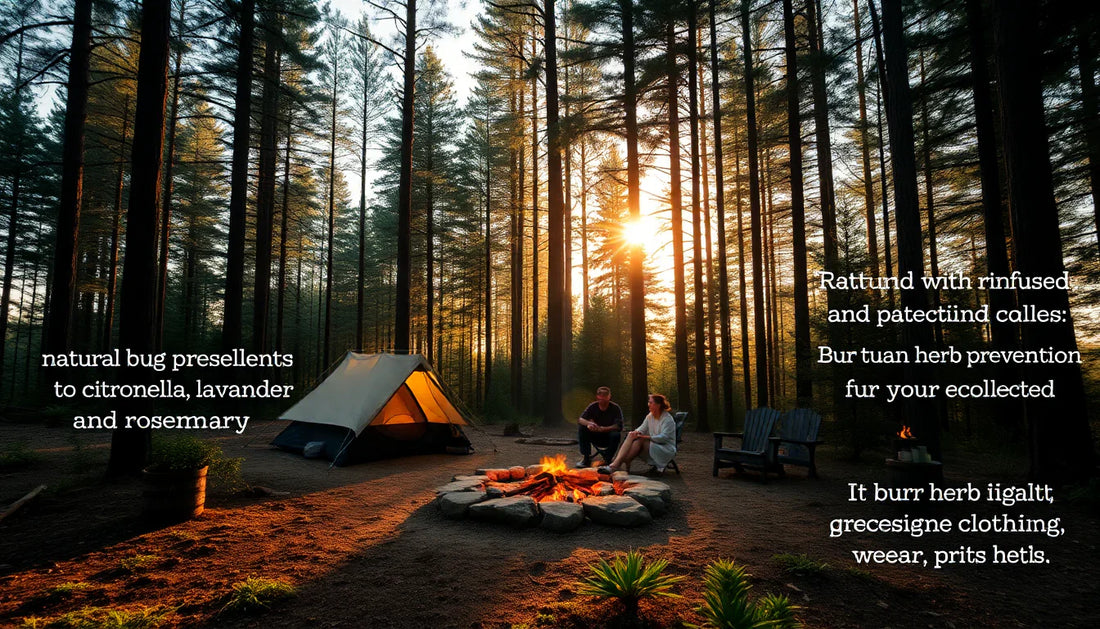
Camping Without the Bite: Effective Natural Solutions to Keep Bugs at Bay
Share
Embarking on a camping adventure is a cherished pastime for many, offering a chance to immerse oneself in the great outdoors and reconnect with nature. However, one common challenge that often dampens the camping experience is the persistent presence of pesky insects. From mosquitoes and ticks to a host of other biting bugs, these unwelcome visitors can quickly turn a peaceful retreat into a frustrating battle.
Fortunately, there are a variety of natural and effective solutions that can help you enjoy your camping trip without the constant annoyance of bugs. In this comprehensive guide, we'll explore the most common camping insects, discuss proven strategies for natural bug repellent, and provide practical tips to keep your campsite bug-free.
Understanding Common Camping Insects
Before we dive into the solutions, it's important to understand the main culprits that can disrupt your camping experience.
Mosquitoes
Mosquitoes are perhaps the most notorious of camping insects, with their relentless buzzing and painful bites. These blood-sucking pests are attracted to the carbon dioxide we exhale and the warmth of our bodies, making them a constant nuisance during outdoor activities.
Ticks
Ticks are another significant concern for campers, as they can transmit serious diseases such as Lyme disease. These small, parasitic arachnids thrive in wooded and grassy areas, waiting to latch onto unsuspecting hosts.
Other Common Camping Bugs
In addition to mosquitoes and ticks, campers may also encounter a variety of other insects, including ants, flies, spiders, and even the occasional bee or wasp. While not all of these bugs are necessarily dangerous, their presence can still disrupt your peaceful outdoor experience.
Natural Bug Repellent Strategies
Fortunately, there are several natural and effective solutions to keep these unwanted guests at bay. By incorporating a combination of these strategies, you can enjoy a bug-free camping trip.
Essential Oils and Herbal Solutions
Many essential oils and natural herbs possess insect-repelling properties. Citronella, lemongrass, peppermint, and eucalyptus are just a few examples of natural ingredients that can be used to create effective bug sprays and candles. These plant-based solutions are often gentler on the skin and the environment compared to synthetic chemical repellents.
DIY Bug Spray Recipes
You can easily make your own natural bug spray at home using a blend of essential oils, carrier oils, and other natural ingredients. Some popular DIY recipes include a combination of witch hazel, apple cider vinegar, and essential oils like lavender, tea tree, and rosemary.
Clothing and Gear Protection
Choosing the right clothing and gear can also help deter bugs while camping. Opt for long-sleeved shirts, pants, and socks made of lightweight, breathable fabrics that can help create a physical barrier against insects. Additionally, using bug-proof tents, hammocks, and other camping equipment can further enhance your protection.
Preventative Camping Practices
In addition to natural repellents, there are several preventative measures you can take to minimize your exposure to bugs while camping.
Campsite Selection
When choosing a campsite, look for areas that are well-ventilated and away from stagnant water sources, which can be breeding grounds for mosquitoes and other insects.
Proper Clothing Choices
Wearing light-colored, loose-fitting clothing can make it easier to spot and remove any ticks or other bugs that may try to hitch a ride. Tuck your pants into your socks and wear closed-toe shoes to further protect your skin.
Timing and Environmental Considerations
Certain times of day and environmental conditions can influence the activity and prevalence of insects. For example, mosquitoes are typically more active at dawn and dusk, so you may want to plan your outdoor activities accordingly.
Effective Bug Control Gear
In addition to natural repellents and preventative measures, there are also specialized camping gear and equipment designed to keep bugs at bay.
Recommended Insect Protection Equipment
Consider investing in items like bug-proof tents, mosquito nets, and portable bug zappers to create a physical barrier against insects in your camping area.
Portable Bug Barriers
Portable bug barriers, such as pop-up screens or mesh enclosures, can be set up around your campsite to create a protected zone free from pesky bugs.
Camping-Specific Protective Clothing
Look for camping-specific clothing and accessories that incorporate insect-repellent technologies, such as permethrin-treated fabrics or built-in bug shields.
Emergency Bug Bite Treatment
Despite your best efforts, it's possible that you may still encounter the occasional bug bite or sting while camping. In such cases, it's important to have a plan for effective and natural treatment.
Natural Remedies
Soothing natural remedies like aloe vera, witch hazel, or a paste made from baking soda and water can help reduce swelling, itching, and discomfort from bug bites.
First Aid Techniques
Proper first aid, such as cleaning the affected area and applying a cold compress, can also help alleviate the symptoms of bug bites and stings.
When to Seek Medical Attention
In some cases, bug bites or stings may require medical attention, especially if you experience severe reactions or suspect the presence of a tick. Be prepared to seek professional help if necessary.
Conclusion
Camping should be a time to disconnect from the stresses of everyday life and immerse yourself in the beauty of the great outdoors. By incorporating natural and effective solutions to keep bugs at bay, you can ensure a comfortable and enjoyable camping experience.
Remember, preparation is key. Equip yourself with a variety of natural bug repellents, protective gear, and preventative strategies to create a bug-free oasis in the wilderness. With these tips, you can focus on the true joys of camping – connecting with nature, making memories with loved ones, and creating a lasting appreciation for the great outdoors.
So pack your bags, grab your camping gear, and embark on your next adventure, confident in your ability to keep those pesky bugs at bay. Happy camping!
